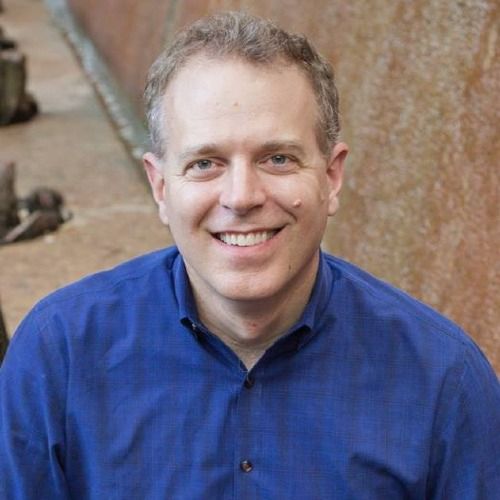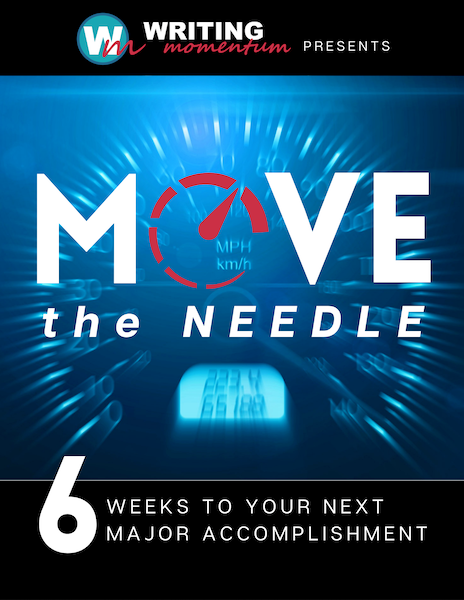Episode 113
Habits That will TANK Your Writing - Part 3
In this episode of the Writing Momentum podcast, hosts Gena and Christopher Maselli explore the final habit in their series that can significantly hinder a writer's productivity: excessive, mindless screen time. They discuss how spending too much time on devices like televisions, computers, mobile phones, and video game screens without purpose can detract from valuable writing time. The Masellis share personal experiences and strategies to reduce mindless screen time, emphasizing the importance of being intentional with how one spends their screen time. They encourage listeners to engage in activities that contribute to their writing goals and suggest ways to reduce mindless screen time to improve focus, creativity, and ultimately, writing output.
00:00 Welcome to the Writing Momentum Podcast!
00:28 Recap: Habits That Can Tank Your Writing - Parts 1 & 2
02:36 The Final Habit: Mindless Screen Time
03:14 The Shocking Reality of Screen Time
04:45 Calculating the Impact of Screen Time on Your Life
09:37 Reallocating Screen Time to Boost Writing Productivity
15:02 Practical Steps to Reduce Mindless Screen Time
18:26 Conclusion: The Power of Intentional Time Management
LINKS:
- Liz Wilcox's Email Marketing Membership at http://wmdeal.com/liz
- Get your FREE Move the Needle goal-setting for authors ebook at https://www.writingmomentum.com
- Write with us! Join Chris, Gena, and Rene each Wednesday at noon Central and let's get our writing DONE! https://www.writingmoments.com
Transcript
What's one of the biggest habits that can tank your writing?
Speaker:Let's find out together.
Speaker:Hi, welcome to the Writing Momentum podcast, I am Gena Maselli and I'm
Speaker:here with my husband and writing partner and tough editor and what else?
Speaker:All around cheerleader.
Speaker:All around cheerleader.
Speaker:Chris, my name is Chris.
Speaker:Christopher Maselli.
Speaker:We're so glad you're here with us today, and if you'll notice, this is part three,
Speaker:Chris, of a series we've been doing on habits that can tank someone's writing.
Speaker:Ooh yeah, there's, you know, there are habits that we can develop in
Speaker:our lives that can just really make it hard for us to be successful
Speaker:when it comes to our writing, and we've been talking about those.
Speaker:In part one, We talked about what?
Speaker:We talked about comparison, ugh, getting in that comparison trap will
Speaker:just really be terrible and will keep you so discouraged and playing some
Speaker:severe mind games, but also just being out of the writing world, just not
Speaker:being a part of that and not making friends in it, building that tribe.
Speaker:That can really tank your writing.
Speaker:It can really get you off track.
Speaker:And then not just the tribe, but also staying up to date with what's going on
Speaker:with writing, with reading books about writing, or watching videos about writing.
Speaker:Just kind of keeping your mind set on those things.
Speaker:Those can really help your writing, but if you're not doing them, it can
Speaker:kind of tank your writing because you're not filling up your tank.
Speaker:To use a play on words, I guess.
Speaker:As you go, right?
Speaker:Right, exactly.
Speaker:And then part two.
Speaker:Part two was talking about distractions while writing.
Speaker:I'm always, I, that's probably the hardest one for me.
Speaker:I always find myself easily distracted.
Speaker:Yeah, I think everybody does.
Speaker:Which is why, you know, I think we talked about the Pomodoro Technique and because
Speaker:that gives you time for distractions.
Speaker:It gives you time when something is something that you need to put
Speaker:your attention to, you build in some time to step away from writing
Speaker:in a very structured way to get your, those distractions taken
Speaker:care of and then get right back into it and make the most of it.
Speaker:That's right.
Speaker:And then we also talked about perfectionism.
Speaker:Oh, maybe that's the one that I struggle with.
Speaker:I think a lot of people struggle with perfectionism, just always feeling like
Speaker:your work isn't good enough or feeling like it's I don't know, fill in the blank.
Speaker:Your writing's not good enough.
Speaker:Your marketing's not good enough.
Speaker:Your book isn't this enough or that enough or just whatever.
Speaker:It's again, it's a mind game.
Speaker:Well, today we're going to talk about the final habit that can tank your writing.
Speaker:And I'm a little bit concerned.
Speaker:I'm a little bit concerned because If we haven't stepped on your toes yet, this
Speaker:one may do it because I've not mentioned this to anyone where they're just like,
Speaker:ouch, that really steps on my toes.
Speaker:It steps on my toes.
Speaker:I've got to tell you, I'm not happy about it.
Speaker:So this one we're going to talk about, we're going to
Speaker:call it mindless screen time.
Speaker:And when we define screens, we're talking about television screens, and computer
Speaker:screens, and mobile phone screens.
Speaker:But before you just shut this off and say, I don't hear about that, I think
Speaker:you're gonna be fascinated at the numbers that we're gonna share in this episode.
Speaker:And I really encourage you to listen because when I discovered these numbers,
Speaker:it kind of rocked my world a bit.
Speaker:And I think that it might rock yours too.
Speaker:Well, and I want to add one more to your list.
Speaker:You said television.
Speaker:You said phone.
Speaker:You said, what else did you say?
Speaker:Computer screens.
Speaker:I would also say video game screens.
Speaker:Oh, video game screens too.
Speaker:Yeah.
Speaker:All of those things are mindless screen time.
Speaker:They're mindless entertainment.
Speaker:Now we need to set a disclaimer here.
Speaker:And that is screens in themselves are not bad, right?
Speaker:I find a good portion of my life is surrounded by screens.
Speaker:I learn from screen time.
Speaker:I work all day on a computer screen.
Speaker:And so when we're talking about, that's why we use the word mindless
Speaker:screen time, because we're not talking about exercising with a fitness video.
Speaker:We're not talking about learning something new online.
Speaker:We're talking about the times when you're mindlessly just on your phone
Speaker:scrolling or you know you're just there's like nothing else to do and you're just
Speaker:sitting and watching television or playing a video game or something like that.
Speaker:Or on social media.
Speaker:Or on social media, right?
Speaker:That's what we're gonna define as mindless screen time.
Speaker:Yeah.
Speaker:Now.
Speaker:I told you we're going to get to numbers.
Speaker:This is going to be really interesting because when I first found out about this
Speaker:it happened when I was, I believe I was reading an article that said that, you
Speaker:know, people in the U S roughly watch over four hours of screen time per day.
Speaker:And we're not talking about again, things you learn from exercise and
Speaker:whatever, just mindless screen time.
Speaker:And I thought, No way.
Speaker:No way I do that.
Speaker:I'm a conscientious individual.
Speaker:I don't spend that much time in front of screens mindlessly because I,
Speaker:you know, think about these things.
Speaker:I don't want to do that.
Speaker:I want to make sure.
Speaker:And again, I believe in a degree of mindless screen time in our lives.
Speaker:I think it's good to have some downtime and it's fun, right?
Speaker:Screens can be very captivating today and they can be a lot of fun.
Speaker:So I'm not saying that we should just cut these out of our lives.
Speaker:Being aware of these numbers is important, isn't it?
Speaker:It's important.
Speaker:It's a little humbling as well.
Speaker:It's a little humbling.
Speaker:So here's the numbers.
Speaker:Here's the idea.
Speaker:So I've read that most people spend about four hours a day, and I thought,
Speaker:well, not me, and so I began to look at my day, and I thought, well, I'll
Speaker:wake up and I might watch, you know, half an hour of YouTube videos or so.
Speaker:It's easy to do that when you're watching, catching up on the news, whatever.
Speaker:Lunchtime, a lot of times I would play a mobile game on my phone.
Speaker:Sometimes during the day, as I worked, I might jump into social
Speaker:media for half an hour or more.
Speaker:With the family, maybe round dinner after dinner.
Speaker:We might watch an episode of an hour long TV show, maybe two.
Speaker:Now if you're doing the math, you know what we're at, don't you?
Speaker:We're already at four hours and this is from someone who's like, I'm very busy.
Speaker:I'm very productive and yet I realized man I'm putting in four hours a day.
Speaker:Now that's not necessarily bad, is it?
Speaker:I mean, it's
Speaker:Well, and it's broken up, you know, you don't usually sit and
Speaker:binge for hours at a time, right?
Speaker:But now here's what I want you to hear though as far as the numbers
Speaker:go that to me rocked my world If you spend one hour a day one hour How
Speaker:many hours per year are you spending?
Speaker:365
Speaker:365 right so let's take that though and divide that by the amount of
Speaker:waking hours we have every day.
Speaker:I don't want to.
Speaker:You don't want to?
Speaker:You seem like you're feeling convicted.
Speaker:I do.
Speaker:You're like, I just really don't want to do this podcast episode anymore.
Speaker:Okay, so if you do 365 hours a year, and we divide that by 16, which is 16 hours
Speaker:a day that we're awake, because we're sleeping 8 hours, we're awake 16 hours.
Speaker:How many waking hours each year are we spending in terms of days just
Speaker:watching mindless entertainment?
Speaker:Turns out it's 22 days over three weeks a year.
Speaker:That's for one hour a day.
Speaker:Okay, what if it's two?
Speaker:I'd be 44.
Speaker:So, 44 days, right?
Speaker:So, over a month, if you spend just two hours a day with mindless
Speaker:entertainment, that's spending over a month a year, one twelfth of your
Speaker:year, over that, six weeks, just about, just with mindless entertainment.
Speaker:But remember, my example, I was more than that.
Speaker:Yeah.
Speaker:How about three?
Speaker:How?
Speaker:How many?
Speaker:If you spend three hours a day, how many hours is that a year?
Speaker:It's over a thousand hours a year.
Speaker:1095 hours a year, or 68 days in waking hours.
Speaker:If you spend three hours a day, you are spending more than two months
Speaker:of your entire year, waking hours watching mindless entertainment.
Speaker:And you know what?
Speaker:, it still wasn't how many I was spending . I was spending about four on average.
Speaker:And that's not counting.
Speaker:Binge watching a TV show on the weekend, going to the movies, right?
Speaker:It doesn't count any of that stuff.
Speaker:This is just what I was kind of doing on a regular habit every day.
Speaker:Four hours every day is 1, 460 hours a year.
Speaker:I'm just, I'm looking at Gena's face in the monitor here, just shaking her head.
Speaker:Four hours a day is 1, 460 hours a year or over nine, it's 91 days waking hours.
Speaker:You're spending a quarter of your year.
Speaker:If you're spending four hours a day, three months out of every 12, gone
Speaker:to mindless entertainment every year.
Speaker:That's very easy to do y'all on a regular basis.
Speaker:And I'm not, again, I'm not saying all this to make you feel bad, to make you
Speaker:feel, you know, necessarily convicted.
Speaker:I just, I think it's really good to be aware of this because I know that
Speaker:we as writers, as authors often feel like we just don't have enough time
Speaker:to do things like our writing, right?
Speaker:And we think, how come I never have enough time?
Speaker:And yet we don't realize the kind of time that we can put into
Speaker:just being entertained, right?
Speaker:And again, it's not that this is bad stuff, right?
Speaker:I love entertainment.
Speaker:I love watching television.
Speaker:I love playing video games.
Speaker:I love doing that stuff.
Speaker:I love watching YouTube.
Speaker:But, keeping those things out of check can tank your writing time
Speaker:without you even realizing it.
Speaker:What if you find yourself doing five hours?
Speaker:That's 114 days a year, six hours a day, 137 days every year.
Speaker:That's four and a half months.
Speaker:A third of your year if you do six hours a day, which actually is not
Speaker:hard to do on average if you bring in all those binge times and movies
Speaker:and all the things that you don't count just on your regular day to day.
Speaker:And here's the other thing that I think that we really need to think about.
Speaker:You've gotten quiet, Gena.
Speaker:She does not want to have this episode right now.
Speaker:This is the quietest Gena's ever been on an episode of Writing Momentum.
Speaker:The thought just went through my mind of maybe I should have
Speaker:let you do this one all alone.
Speaker:So Here's what I think that was important to think about.
Speaker:We're not just talking about Wasted Hours.
Speaker:If we're spending four hours a day or three months of our year, right?
Speaker:If we're spending that much time with mindless media, aren't we also framing our
Speaker:world with that much mindless information?
Speaker:Like, aren't, isn't that what we're framing?
Speaker:I mean, think about it.
Speaker:A quarter of your year, right?
Speaker:We talked about how we want to not get out of the writing world.
Speaker:To get into the writing world, we've got to spend time in it.
Speaker:So let's flip this around.
Speaker:What if you spent one hour a day, one hour a day, in the writing world?
Speaker:One hour a day saying, I'm going to just, I'm going to just, Find out
Speaker:what's going on in the writing world.
Speaker:I'm going to learn from a trainer.
Speaker:I'm going to listen to the Writing Momentum podcast.
Speaker:I'm going to join you all for writing moments, whatever.
Speaker:One hour a day.
Speaker:That means that you'll have spent at the end of the year,
Speaker:22 days through over three weeks of your year focused on writing.
Speaker:What if you say, I'm going to spend that plus I'm going to
Speaker:write for an hour every day.
Speaker:Now at the end of your year, you'll have spent 44 days.
Speaker:Waking hours focused on nothing but writing and your book.
Speaker:What if you bump that up to three hours a day?
Speaker:And you say, well, I don't have three hours a day.
Speaker:Well, now wait.
Speaker:Think of how easy it was for me to just use mindless entertainment.
Speaker:I spent 20 minutes in the morning, another, you know, 45 minutes at
Speaker:lunch, an hour later in the day.
Speaker:What if you did the same thing with your writing?
Speaker:At lunchtime, you Go ahead and find out what's going on in the writing world.
Speaker:Maybe in the morning you read a book about writing.
Speaker:Maybe in the evening you spent an hour writing.
Speaker:If you do that and you add up to about three hours a day, by the end of the
Speaker:year, you'll have spent over a thousand hours writing a thousand hours with
Speaker:your mind focused on this thing that you say is super important to you.
Speaker:A thousand hours, that's over two months of your year just focused on your writing.
Speaker:And of course the numbers go up if you spend more.
Speaker:I think that is super empowering.
Speaker:So as much as mindless screen time can tank your writing, if it's not
Speaker:in check, and again, just that little disclaimer, I totally enjoy it.
Speaker:I still do, even after finding out these numbers.
Speaker:But, I've tried to start putting it in check.
Speaker:I've said, you know, I don't want to spend four hours of my day
Speaker:with you know, a quarter of my year with mindless entertainment.
Speaker:Instead, I'm going to keep that in check.
Speaker:I'm going to try and frame my mind differently.
Speaker:My, my worldview, make sure that I've got a focus where I want it focused.
Speaker:And I start to bring those things in place and the things that are important
Speaker:to me, I put regular time into because when I do that, At the end of the
Speaker:year, wow, that's a lot of time.
Speaker:It is.
Speaker:It adds up fast, doesn't it?
Speaker:Well, and I'm thinking, you know, you've had some people that have reached out
Speaker:to us recently about wanting to finish their book and they're staring at
Speaker:empty pages or they're overwhelmed or feel disconnected or whatever it is.
Speaker:And just by sitting down and forcing yourself to write, forcing yourself
Speaker:to journal, forcing yourself to start exercising that muscle,
Speaker:it does start coming together.
Speaker:It does start coming back.
Speaker:And so I think there are a lot of books out there that would get finished from
Speaker:people who have struggled with this.
Speaker:That's, and that's why I think, you know, the internet is a wonderful
Speaker:thing, mobile phones are wonderful things, but, so, so just, Practically,
Speaker:I feel like I need to explain like how I've made this work in my life.
Speaker:So one thing I've done with my mobile phone is I've taken all
Speaker:social media off of it, right?
Speaker:Gotten rid of all the social media.
Speaker:I've gotten rid of all the video apps, all the things that might make it
Speaker:something other than A smartphone like and to make it an entertainment device.
Speaker:I've taken the entertainment for the most part off of my phone.
Speaker:I still use it for phone calls of course, and texting and maps
Speaker:and you know, the rewards at stores and all that sort of thing.
Speaker:But I've tried to keep it to be just as that kind of phone,
Speaker:not an entertainment device.
Speaker:That, is super empowering.
Speaker:It's hard to do.
Speaker:I'll tell you it's hard to do because you're used to having
Speaker:it as an entertainment device.
Speaker:Anytime you're in a checkout line or, you know, anywhere you go, you know,
Speaker:but by taking those things off, it's greatly reduced that mindless video time.
Speaker:It really has.
Speaker:I know I took social media off of mine as well and it's made a huge difference.
Speaker:It makes a huge difference.
Speaker:Huge difference.
Speaker:And in fact, I'll sometimes if I'm all of a sudden catch myself, or I
Speaker:don't catch myself until I've picked it up because I'm standing in the
Speaker:line or I'm just sitting there waiting for something and I pick it up.
Speaker:And it's funny because all of a sudden I go, well, I don't really have
Speaker:anything on here to look at anymore.
Speaker:So, yeah.
Speaker:And that does, I mean, it also just gives your mind a chance to rest.
Speaker:It gives you a chance.
Speaker:It gives your mind a chance to rest.
Speaker:And I know, Chris, since you've been doing it, since you've been super purposeful
Speaker:on that, you have said that you've noticed your creativity has gone up.
Speaker:You've noticed that, well, I'll let you speak.
Speaker:What are some of the things that you've noticed have happened?
Speaker:I've had more peace of mind.
Speaker:My creativity has gone up and I've started to do things like dream at night.
Speaker:It's been years since I've dreamed at night.
Speaker:I just thought it was getting older and not dreaming anymore.
Speaker:I don't know what that's about.
Speaker:No, I think it's because my mind was, I guess, preoccupied with all the
Speaker:mindless entertainment or something.
Speaker:And now that's
Speaker:I think it's just that it's engaged.
Speaker:It's more engaged.,
Speaker:It's constantly engaged, but now you've kind of disengaged, but you give that
Speaker:space in your mind just to be creative.
Speaker:I think that's what you're experiencing.
Speaker:It does take discipline too though.
Speaker:So I've taken that stuff off my phone.
Speaker:That's an easy way.
Speaker:Right.
Speaker:And I can still check social media, you know, on my computer if I want to.
Speaker:But.
Speaker:You know, other than that, like I've had to purposely say, okay,
Speaker:I'm going to try not to watch more than like one show a night.
Speaker:To me, it's easier to do a show versus an hour, right?
Speaker:I'm not timing myself when I watch television.
Speaker:I'll do a show a night or, you know, one movie.
Speaker:That's like an hour and a half.
Speaker:That's it.
Speaker:No more than that.
Speaker:And that's hard to do sometimes, but I've found that it's also, you know what's also
Speaker:done is it's given me more time to read.
Speaker:I love reading but it's easy to stop reading when, cause it's just easier
Speaker:to use the remote and turn on the TV.
Speaker:And so it's helped me read more and then the other thing I've done is
Speaker:because I've taken all the games net off my phone, like during lunchtime,
Speaker:I'm not doing that stuff anymore.
Speaker:Now I'll either read or I'll, you know, get engaged with a teaching,
Speaker:a training, something like that.
Speaker:And that's just been very beneficial.
Speaker:I think that's great.
Speaker:So, we encourage you, here's your homework.
Speaker:Find, is there something, is there some way you can reduce
Speaker:your mindless screen time?
Speaker:You don't have to completely cut it out, but can you reduce it
Speaker:so you're not spending over a thousand hours a year watching.
Speaker:Yeah, just be purposeful.
Speaker:Be purposeful, intentional.
Speaker:I think intentional.
Speaker:I think that's what you're talking about is just being intentional and not
Speaker:just sitting there letting it wash over you without really thinking about it.
Speaker:And Hey, if you have found yourself doing something like this, or if this
Speaker:has benefited you, would you let us know?
Speaker:I'd love to hear what your tips and tricks are to not becoming
Speaker:lost in mindless entertainment.
Speaker:Or if you've had struggles with it, let us know about that too.
Speaker:We'd love to just encourage you and let you know, Hey, we're right there with you.
Speaker:We're on your writing team.
Speaker:That's right.
Speaker:You know, that's the thing that we say often is that this is
Speaker:something that we don't believe that writing is a solitary activity.
Speaker:It's something that's better done in community together.
Speaker:That's why we've got our writing moments on if you go to writingmomentum.
Speaker:com, we write together every week with other writers, and that's a way that
Speaker:we can just encourage one another, keep ourselves in the writing world.
Speaker:Right.
Speaker:And that's strong because together
Speaker:we have writing momentum.
Speaker:See you next week





